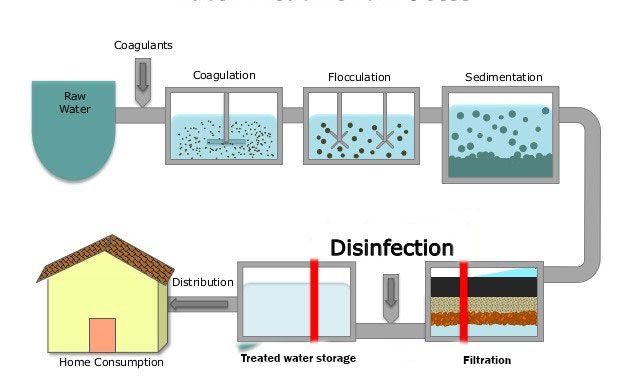Enhance Alcohol Consumption Water Safety And Security with a High-Quality Water Purification System
Enhance Alcohol Consumption Water Safety And Security with a High-Quality Water Purification System
Blog Article
Why a Water Purification System Is Essential for Clean, Safe Water
Access to clean, safe water is a basic human right and a keystone of public health. Nevertheless, the existence of hazardous contaminants such as virus, heavy steels, and chemical toxins in our water increases severe issues regarding wellness and wellness. A water purification system stands as an essential service to alleviate these dangers, making sure that communities and individuals can access safe drinking water. Recognizing the intricacies of these systems and their various methods is crucial, especially as we take into consideration the implications for health results and ecological sustainability in our day-to-day lives.
Significance of Clean Water
Accessibility to tidy water is an essential necessity for human health and wellness. It is crucial for maintaining life, supporting health, and keeping general public health and wellness. Water Purification System. The accessibility of secure drinking water substantially lowers the threat of waterborne conditions, which posture a substantial danger to areas worldwide. Infected water can bring about severe health issues, including gastrointestinal diseases, cholera, and dysentery, particularly in susceptible populations such as children and the senior.
In addition, tidy water is important for sanitation and health practices, which are crucial in avoiding the spread of infectious conditions. Adequate water system supports correct hygiene facilities, advertising a healthier atmosphere. Furthermore, access to safe water influences socioeconomic factors, as it makes it possible for areas to take part in commercial and agricultural tasks, eventually adding to financial advancement.
In many areas, the lack of tidy water worsens poverty and inequality, more impeding progress toward lasting development objectives. As a result, making sure access to tidy water is not only a public health vital but additionally a cornerstone for social equity and financial growth. Initiatives to improve water high quality and facilities have far-reaching advantages, fostering healthier neighborhoods and improving high quality of life.

Usual Contaminants in Water
Ensuring the schedule of clean water is undermined by different impurities that can compromise its safety and top quality. The existence of microorganisms, such as viruses, bloodsuckers, and germs, presents significant wellness dangers, particularly in areas doing not have appropriate hygiene. These microbes can bring about waterborne conditions, causing serious illness or also death.
Chemical contaminants also offer an important issue. Heavy steels, including arsenic, lead, and mercury, commonly enter water products with commercial discharges or corroded pipes. These materials can collect in the body in time, bring about long-term health and wellness issues such as neurological damage and developing problems.
Furthermore, agricultural runoff introduces pesticides and plant foods right into water systems, which can interrupt ecosystems and negatively impact human health. Nitrates, generally found in fertilizers, can cause serious conditions like methemoglobinemia, particularly in babies.
Benefits of Water Purification Equipments
Recognizing the important demand for secure alcohol consumption water, water purification systems provide a myriad of advantages that boost public wellness and ecological sustainability. Primarily, these systems effectively remove hazardous pollutants, consisting of microorganisms, infections, hefty metals, and chemicals, making certain that the water taken in is without toxins and microorganisms. This decrease in contaminants dramatically decreases the threat of waterborne illness, advertising general area health.
Along with health and wellness advantages, water purification systems contribute to environmental sustainability by minimizing dependence on mineral water, which often produces extreme plastic waste. By utilizing a filtration system, households can decrease their carbon footprint and contribute to an extra lasting environment. These systems can boost the preference and smell of water, making it a lot more palatable for day-to-day intake.

Different Kinds Of Purification Approaches

One typical technique is reverse osmosis, which uses a semi-permeable membrane layer to separate water from liquified solids and contaminants. This process properly minimizes pollutants, consisting of heavy metals and chemicals. One more commonly pop over to this site used method is ultraviolet (UV) sanitation, which utilizes UV light to reduce the effects of viruses and microorganisms, making them harmless without making use of chemicals.
Turned on carbon filtering is one more prominent method, making use of carbon to adsorb organic substances, chlorine, and unpleasant odors, enhancing preference and odor high quality. Distillation, a process that includes boiling water and condensing the heavy steam, efficiently removes impurities and minerals yet may require more power contrasted to other methods.
Ion exchange is usually used to soften water by changing calcium and magnesium ions with salt or potassium ions. Each approach has its limitations and advantages, making it vital to recognize their performances and performance in addressing certain water quality issues - Water Purification System. Ultimately, choosing the ideal filtration technique is crucial for ensuring risk-free and clean alcohol consumption water
Selecting the Right System
Choosing a suitable water filtration system calls for careful consideration of numerous elements, including the certain impurities existing in the water, the volume of water needed, and the preferred purification method. It is vital to conduct a water top quality examination to identify pollutants such as bacteria, hefty steels, or chemical contaminants. This details will assist you Web Site in choosing a system that successfully targets those details contaminations.
Following, assess your family's daily water usage to figure out the system's capacity. Solutions are readily available in various sizes, from point-of-use filters for alcohol consumption water to whole-house systems that detoxify all water entering your home.
Furthermore, think about the filtration approach that finest fits your needs. Reverse osmosis is extremely reliable for getting rid of a wide range of pollutants, while UV purification is exceptional for getting rid of microbes.
Conclusion
In verdict, the execution of water filtration systems is essential for guaranteeing access to tidy and risk-free water. By recognizing the value of clean water and the advantages of different purification approaches, communities can make educated decisions to guard their wellness and promote socioeconomic security.
Recognizing the important requirement for safe alcohol consumption water, water purification systems provide a myriad of advantages that improve public health and wellness and environmental sustainability.In addition to health and wellness benefits, water purification systems contribute to ecological sustainability by lowering reliance on bottled water, which usually generates excessive plastic waste. Eventually, the adoption of water purification systems is an aggressive action towards making sure tidy, secure water for future generations while securing public health and the environment.
Picking a suitable water filtration system needs mindful consideration of numerous factors, including the particular impurities existing in the water supply, the volume of water required, and the wanted filtration technique.In conclusion, the implementation of water purification systems is important for guaranteeing access to clean and safe water.
Report this page